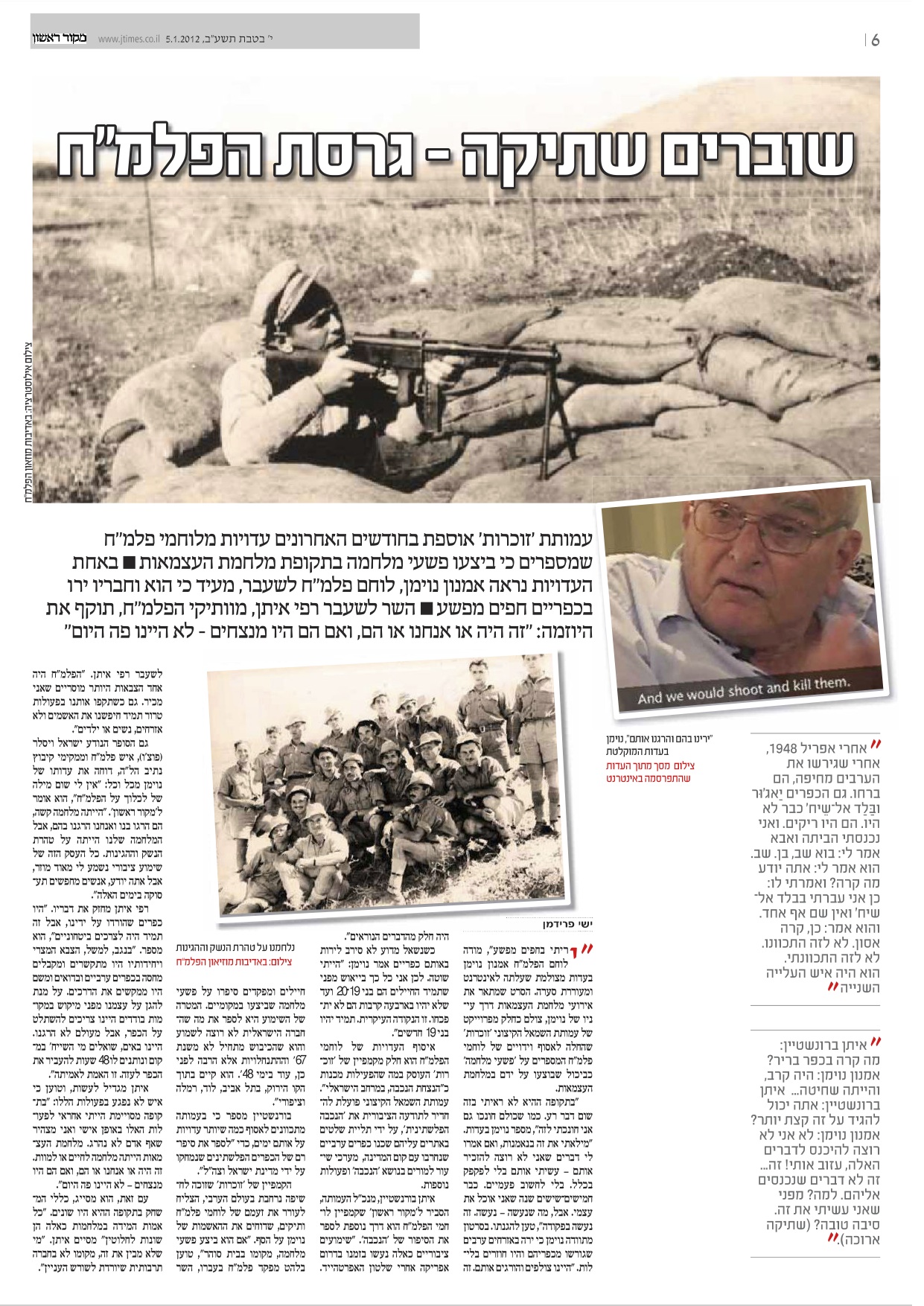During the past few months, Zochrot has been collected testimonies from Palmach fighters describing war crimes committed during the War of Independence. In one of the testimonies Amnon Noyman, a former Palmach fighter, describes how he and his comrades shot innocent villagers. Rafi Eitan, the former government minister and Palmach veteran, condemns the project: “It was us or them, and if they had won – we wouldn’t be here today.”
By Yishai Friedman
“I shot innocent people,” admits Palmach fighter Amnon Neuman in filmed testimony that appears on the internet and has raised a storm. The film, presenting Neuman’s perspective on events that occurred during the War of Independence, is part of a project undertaken by Zochrot , an extreme left-wing organization, which has begun gathering confessions by Palmach fighters describing alleged “war crimes” they committed during the War of Independence.
“I saw nothing wrong with it then. That’s how I was taught, just like everyone was taught,” Neuman says in his testimony. “I did my job faithfully, and if I was told to do things I’d rather not mention – I did them without question. Without thinking twice. I’ve been eating myself up over this for the last 50-60 years. But what was done is done. I was following orders,” he said in his defense. In the film Neuman admits shooting Palestinian civilians who had been expelled from their villages and returned at night. “We sniped and killed them. Those were some of the terrible things.”
When asked why he didn’t refuse to shoot those villagers, Neuman said: “I was a fool. That’s why I despair, because soldiers are always 19-20 years old, and they won’t open their eyes until they’ve been in four battles. That’s the important point. There will always be fresh 19-year-olds. “
Gathering testimonies from Palmach fighters is part of Zochrot’s campaign dealing with what its activists call “commemorating the nakba in the Israeli space.” The extreme left-wing organization works to make the “Palestinian nakba” a part of Israeli public discourse by erecting signs at locations of Palestinian villages destroyed when the state was established, preparing lesson plans for
teachers about the “nakba” and other activities.
Eitan Bronstein, the director, told Makor Rishon that the Palmach fighters project is an additional way to talk about the “nakba.” “Such public hearings were held in South Africa after the end of the apartheid regime. Soldiers and commanders recounted war crimes they’d committed against civilians. The purpose of the hearing is to report what Israeli society doesn’t want to hear, that the occupation didn’t begin in 1967 or with the settlements, but much earlier, back in 1948. It exists inside the Green Line, in Tel Aviv, Lod, Ramla and Tzippori.”
Bornstein says that Zochrot plans to gather as many testimonies as it can about that time, to “tell the story of the Palestinian villages that were erased by the state of Israel and the IDF.”
Zochrot’s campaign, which has been extensively covered in the Arab world, has managed to enrage Palmach veterans who reject Neuman’s accusations outright. “If he committed war crimes, he belongs in jail,” says the former Palmach fighter and ex-minister Rafi Eitan heatedly. “The Palmach was one of the most moral armies I know. Even when we were subject to terrorist attacks we always sought those who were responsible, not civilians, women or children.”
Israel Visler (Pucho), the famous author, member of the Palmach and a founder of Kibbutz Nativ HaLamed-Hey, also totally rejects Neuman’s accusations: “I have nothing bad to say about the Palmach,” he tells Makor Rishon. “It was a difficult war, they killed us and we killed them, but we fought with a purity of arms, decently. This entire business of a public hearing is very strange – but, you know, people are looking for something to do these days.”
Rafi Eitan agrees with him. “We eliminated some villages, but it was always for reasons of security,” he says. “In the Negev, for example, the Egyptian army and its units would contact Arab and Bedouin villages, be given shelter and then mine the roads. To protect ourselves against mines in isolated areas we had to take over the village, but we never killed anyone. We’d come, find out who the sheikh was, and give them 48 hours to go to Gaza. That’s the real truth.”
Eitan goes even farther, claiming no one was injured in those actions: “For a while I was personally responsible for these operations, and I tell you that no one was killed. The War of Independence was a war of life and death. It was us or them, and if they had won – we wouldn’t be here today.”
But, he admits, the rules of the game were different then. “Standards were very different in such wars,” he concludes. “Whoever fails to understand that doesn’t belong in a civilized society trying to get to the root of the matter.”
“After April, 1948, after we expelled the Arabs from Haifa, the villages of Yajur and Balad-al-Sheikh also no longer existed. They were empty. And I came home and my father said: Come, sit down son, sit. He said: Do you know what happened? And I said: Yes, I went through Balad-al-Sheikh and there’s no one there. And he said: Yes, a catastrophe occurred. That’s not what we wanted. That’s not what we intended. He was part of the Second Aliyah.”
“Eitan Bronstein: What happened in the village of Burayr? Amnon Neuman: There was a battle, a massacre…Eitan Bronstein: Can you tell us anything more about it? Amnon Neuman: No, I don’t want to go into it. Leave me alone! It’s…it’s not something to go into. Why? Because I did it. Is that a good enough reason? (A long silence).”
Download File



